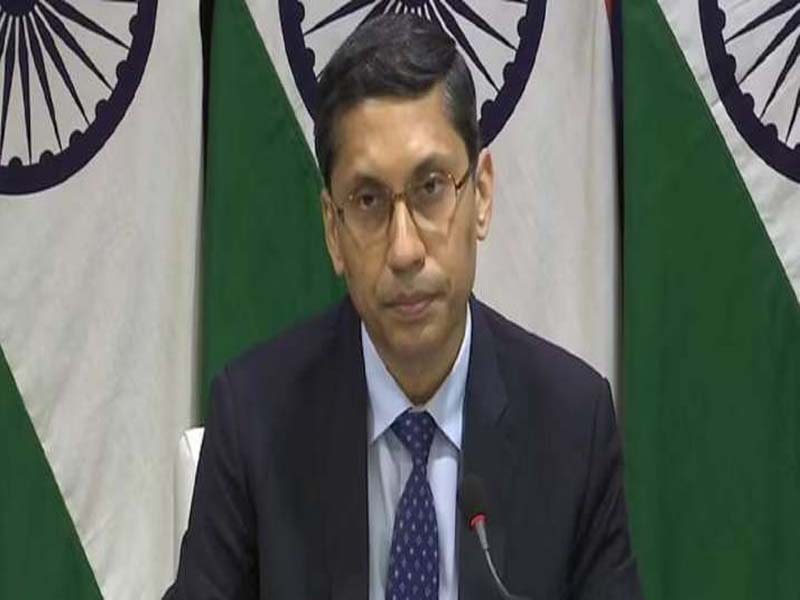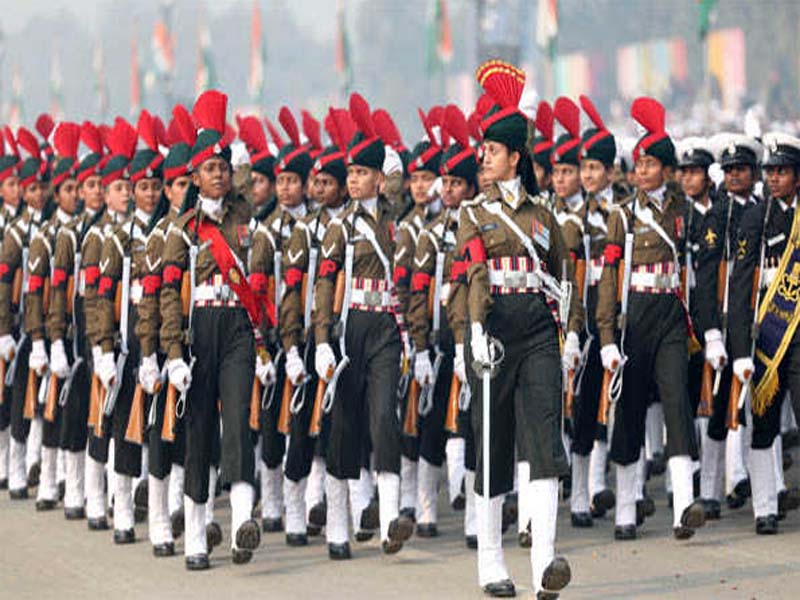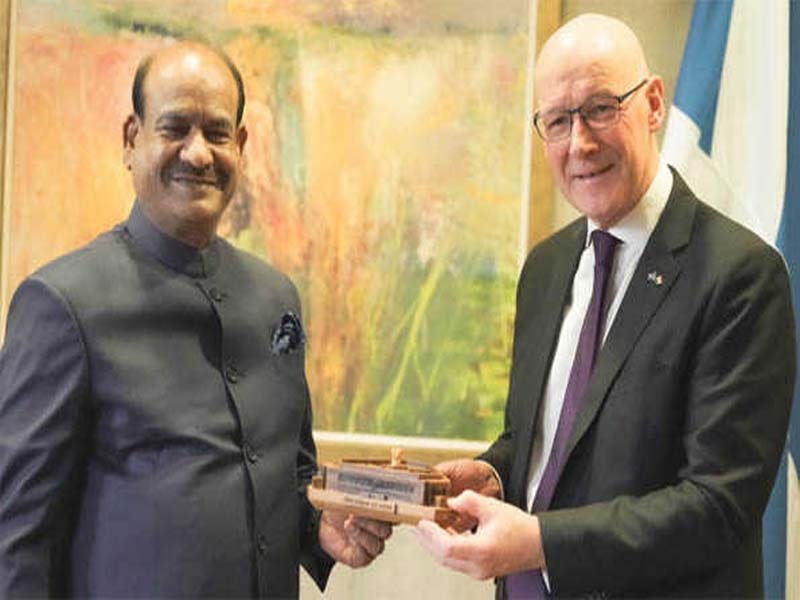India, Central Asian countries to set up Joint Working Group on Afghanistan, hold summit meet every 2 years
New Delhi, Jan 27 : India and the Central Asian countries Today agreed to continue close consultations on the situation in Afghanistan, and in this regard decided to establish a Joint Working Group at the Senior Officers Level, as Prime Minister Narendra Modi hosted the Presidents of the five nations at the first ever India-Central Asia Summit, held virtually. “The evolving situation in Afghanistan and its impact on the security and stability of the region was discussed in detail. The Leaders reiterated their strong support for a peaceful, secure and stable Afghanistan and also discussed the current humanitarian situation and decided to continue to provide immediate humanitarian assistance to the Afghan people,” Reenat Sandhu, Secretary West in the MEA, said briefing the media on the summit. “An important outcome of the meeting today was the agreement among the Leaders of India and Central Asian countries to hold Summit level meetings every two years. The next Summit would accordingly be held in 2024,” she said. One of the key proposals made by Prime Minister Modi was to institutionalize the framework for India-Central Asia cooperation at a regional level and to include annual Ministerial meetings of the Foreign Ministers, Trade Ministers, Cultural Ministers and Secretaries of Security, to strengthen cooperation in the areas of political and development partnership, trade and connectivity, culture and tourism, and security. He also proposed the setting up of an ‘India-Central Asia Center’ in New Delhi to serve as a Secretariat for supporting this framework of cooperation. “Prime Minister Modi underlined the importance of setting an ambitious agenda for our partnership, taking into account the changing global environment and aspirations of our youth. In this context, he suggested preparing a road map for the next 30 years, focussing on connectivity and cooperation in an integrated manner,” she said. In the area of trade and economic cooperation, PM Modi proposed organizing a Round Table on Connectivity and Energy Cooperation, two important aspects of India’s economic relations with Central Asia. The leaders also discussed ways to enhance connectivity and trade, especially the Chabahar port in Iran. India welcomed the interest of the Central Asian countries to utilize the services of Shahid Beheshti Terminal at Chabahar Port in Iran and proposed the establishment of a Joint Working Group on Chabahar Port to address issues of free movements of goods and services between India and Central Asian countries. The proposal was welcomed by Central Asian countries. On connectivity, the Delhi Declaration joint statement said that the Leaders emphasized that connectivity projects deserve priority attention and could be a force-multiplier for trade and economic cooperation and contacts between countries and people. “India and the Central Asian member countries of the International North-South Transport Corridor (INSTC) as well as the Ashgabat Agreement on International Transport and Transit Corridor called upon the other Central Asian countries to consider joining these connectivity initiatives. The sides supported India’s proposal to include the Chabahar Port and noted Turkmenistan’s proposal to include the Turkmenbashi Port within the framework of INSTC. “The Sides agreed that connectivity initiatives should be based on the principles of transparency, broad participation, local priorities, financial sustainability and respect for sovereignty and territorial integrity of all countries,” it said, in an apparent reference to the Belt and Road Initiative of China, which has been accused of landing countries in deep debt and transgressing territorial sovereignty. The leaders also condemned terrorism in all its forms and manifestations and reiterated that providing support, using terrorist proxies for cross-border terrorism, terror financing, arms and drugs trafficking, dissemination of a radical ideology and abuse of cyber space to spread disinformation and incite violence, goes against the basic principles of humanity and international relations, the joint statement said. They agreed that terrorism must be comprehensively countered to achieve a “World free of Terror.” The Central Asian Leaders stressed the importance of further universalization of the ‘Code of Conduct towards Achieving a World Free of Terrorism’, which for the first time acknowledged the interconnection between security, combating terrorism and development, thus facilitating the advancement of the Sustainable Development Goals, it said. They also called for early adoption of the UN Comprehensive Convention on International Terrorism. They paid attention on the need to establish cooperation between specialized national institutions, including in the fields of finance, renewable energy, information, digital and other advanced technologies. In this context, they welcomed the proposal for establishment of an “IT/ITES Task Force” between the IT organizations, IT parks and IT companies of India and the Central Asian countries to work towards greater digitalization and E-Governance in their countries, as well as business process outsourcing (BPO) by sharing of best practices, knowledge etc. They also agreed that Joint Counter-Terrorism Exercises will be held between India and interested Central Asian countries. India will also host a 100-member youth delegation from the Central Asian countries every year to promote greater understanding. India will organize customized professional training programmes for Central Asian diplomats and also provide additional training slots and scholarships in other areas to meet the requirements of Central Asian countries. India and Central Asian countries agreed to celebrate the 30th anniversary of diplomatic relations by organizing various activities including issuance of joint postal stamps. The two sides agreed to give greater attention to cultural cooperation by hosting regular Film Festivals, promoting cooperation between museums, undertaking translation of literary works, digitization of manuscripts, academic research and restoration work related to cultural heritage. To highlight the linguistic and spiritual linkages, the sides agreed to commission a ‘Dictionary of Common words used in India and Central Asian countries’ and showcase a Buddhist exhibition in Central Asian countries. The summit, with the theme ‘Taking India-Central Asia relations to new heights’. lasted for more than one and a half hours. At the summit, the leaders reviewed the progress made in India-Central Asia relations during the past three decades since the establishment of diplomatic ties and discussed their vision of taking the partnership to greater heights in the coming years by enhancing cooperation across several areas. They also held candid exchange of views on regional and international issues of interest, especially the current regional security situation, said Secretary West Sandhu. Other proposals of India included establishment of separate forums for interaction between Think-tanks, Chambers of Commerce and Universities of India and Central Asian countries. All these proposals were welcomed and supported by the Leaders of the Central Asian countries. (UNI)



